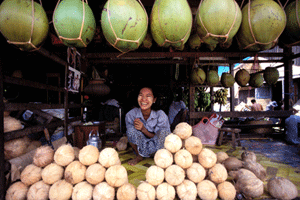BUSINESS (April 2010)
Rangoon Markets to be Rebuilt
 |
| A coconut vendor at a market in Rangoon (Photo: AP) |
Burma Creating E-gov’t System
Burmese software companies are striving to introduce an e-government system at all 32 ministries. So far, implementation has taken place in nine ministries—commerce, agriculture and irrigation, labor, home affairs, culture, transport, industry, electric power, and communications, posts and telegraphs, said a Xinhua news agency report quoting sources at the Myanmar Computer Association. Meanwhile, in the banking sector, Burma has introduced a network system in six domestic banks to interlink state and private banks to facilitate transactions. The network is in use at Yoma Bank, Myanmar Citizens Bank, Tun Foundation Bank, Myanmar Foreign Trade Bank, Myawaddy Bank and Myanmar Industrial Development Bank.
$40 Million from Burma Casino Laundered in Hong Kong
Profits from an illegal casino in Burma have been laundered through banks in Hong Kong. The racket, involving a Hong Kong family and unidentified Burmese, was exposed in a Hong Kong court in March when one man was found guilty of laundering proceeds through several bank accounts. The location of the casino was not disclosed in the Hong Kong district court but was said to be on the Burmese side of the border with China’s Yunnan Province near the Chinese town of Ruili. A report in The Standard newspaper said Tam Hung operated his New Oriental Casino between October 2005 and March 2007 with members of his family after they were forced by the Chinese authorities to give up gambling rackets in Ruili. Prosecutors said US $40.4 million was found in various Hong Kong accounts.
China Plans Beijing-Rangoon High Speed Train
China has plans to include Burma in one of three high-speed railway routes to India, Europe and Southeast Asia involving 300 km/hour passenger and freight trains. One of the routes would run from Beijing to Singapore via Vietnam, Thailand, Burma and Malaysia, according to a Chinese Academy of Engineering official quoted by the London Daily Telegraph newspaper. “Construction for the Southeast Asian line had already begun in the [Chinese] southern province of Yunnan and Burma was about to begin building its link,” the newspaper quoted Wang Mengshu, a member of the Chinese Academy of Engineering, as saying. “China has offered to bankroll the Burmese line in exchange for access to the country’s rich reserves of lithium, a metal widely used in batteries.” Other high-speed lines would run between Beijing and London via Russia and from Beijing to India.
Controversial Laotian Mega-dam Begins Operation
The Nam Theun 2 dam in Laos, criticized by environmental groups and financed in part by the World Bank, has begun to generate electricity for sale to Thailand, with some also sold to a domestic power supplier. Laos has said that the mega-dam and more than a half dozen others on the planning boards will help lift the country out of poverty, but environmental groups have criticized the project for spurring illegal logging, incursions into a bio-diverse region and relocation of villagers. The US $1.45 billion project is co-owned by the Lao government, Electricité de France, the Elecricity generating Public co of Thailand and Italian-Thai Development.
1 | 2 next page »
